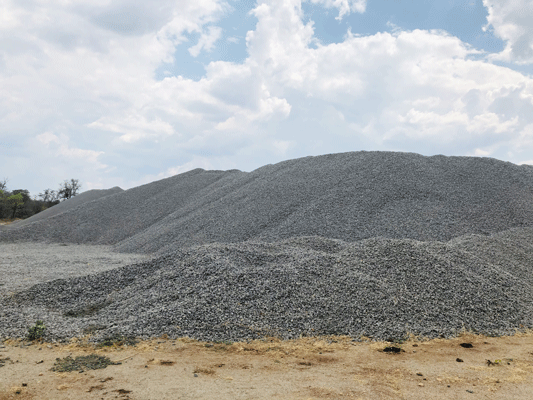
SEVENTY-NINE year-old Rebecca Moyo staggers while carrying a huge boulder of quarry stone, before she can walk a few metres with it, she gets tired and pushes the boulder to her shed.
BY LETHOKUHLE NKOMO
Barefooted, she walks on the hot ground in Hwange which has given her blisters, making it impossible to wear closed shoes.
The brownish water in the five-litre container will quench her thirst for the day.
To avoid the scorching sun of Hwange, Moyo erected a shed with empty plastic cement bags, which are supported by mopani trees. The shed is surrounded by piles of medium-sized processed quarry stones ready for the market.
The difficult economic environment has forced elderly women in Hwange to get involved in quarry mining despite the dangers involved in the operations.
A number of unregulated quarry miners are camped at the Hwange industrial site, near David Qui, a Chinese quarry mining company where they use firewood to blast open huge stones.
Quarry mining is regarded as a risk industry worldwide because of the hazardous nature of its activities.
- Chamisa under fire over US$120K donation
- Mavhunga puts DeMbare into Chibuku quarterfinals
- Pension funds bet on Cabora Bassa oilfields
- Councils defy govt fire tender directive
Keep Reading
Mining plays an important role in the socio-economic development of many countries worldwide.
In Zimbabwe, quarry stones are mainly used in the construction industry.
The Hwange unregulated quarry miners are camped at the entrance and around the Chinese company where they eye for the same quarry clients with the Chinese-owned quarry mine.
Moyo is among the Hwange elderly women, who have resorted to quarry mining for a living.
“Quarry mining is not an easy job to do. it requires a lot of extensive hard labour because I don’t use any machinery but my bare hands,” she said.
“The main reason I am doing this is because I am taking care of my six grandchildren. If I don’t do it, my grandchildren will not have food to eat.
“I tried to register for social welfare and with those NGOs which support the elderly, but it was all in vain.”
She has been staying with the grandchildren after her children left for South Africa in search of greener pastures years ago.
Moyo has been in quarry mining for the past 10 years. She uses a heavy metal hammer and her bare hands to break the quarry into smaller pieces.
Concilia Ndlovu, (66) a mother of four children from Mpumalanga township in Hwange, who is also in quarry mining, says it is the only source of income that she has.
“Things are tough here! the dangers we face can make one give up, but the thought of no school fees for children will make you strong,” Ndlovu said.
Sibanda said Covid -19 and the economic situation in the country had made business unviable.
“We scramble for clients with that Chinese company, of course, many clients prefer them because they offer better services, but it’s a disadvantage for us who are doing it on a very small scale and who have been around for a while,” she said.
“We sometimes get clients once after four months.”
“If only the Chinese company could incorporate us because they are the ones who came where we have been operating.”
Poverty is one of the main drivers of unsafe mining activities. Poverty continues to be one of the major underlying causes of vulnerability and food insecurity.
According to the Zimstat Poverty, Income Consumption and Expenditure Survey 2017 Report, 70.5% of the population was said to be poor whilst 29.3% were deemed extremely poor.
Zimstat also shows the total consumption poverty line (TCPL) for an average of five persons per household stood at $17 957.00 in September 2020, but the majority of families in Hwange are below that.
Research done by Women Coalition of Zimbabwe (WCOZ) shows that women are usually at the receiving end when it comes to suffering whenever there is an economic meltdown.
“Women bear the most pain when poverty strikes the family, they are the ones who have to feed the children, that’s why they end up engaging in unsafe practices just to feed the children,” said WCOZ official Catherine Madondo.
Meanwhile, ward 7 councillor Wilson Maphosa said although people were doing a lot of things to earn a living, he was not aware of quarry mining at the industrial site.
“I’m not aware of those quarry miners, who gave them permission to mine there?
“No one has never told me about these miners even though they are in my area of jurisdiction,” Maphosa said.
The small-scale miners operating at the industrial site use the traditional way of blasting stones.
It takes a month and a half to crush the quarry to fill a 30-tonne truck.
The 30 tonnes of quarry is sold at US$100 to Hwange, Victoria Falls, Lupane and Bulawayo builders.
However, the US$100 profit made after one and a half months is not enough to feed a family of six children.
l This article was originally published by The Citizen Bulletin, a hyperlocal news outlet covering Covid-19 in Matabeleland.










